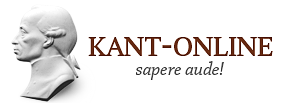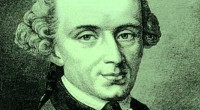Professor T. Rosefeldt: «Kant is being studied everywhere now»
Since 2010 professor Tobias Rosefeldt has been the head of the Department of Classic German Philosophy in one of the biggest universities in Germany – Humboldt University of Berlin. He specialized in Kant’s theoretic philosophy (transcendental idealism, theory of language, metaphysics of existence, Early Modern philosophy).
The interview with professor Rosefeldt and the chance to explore his department were provided within the international program Erasmus Mundus Action 2, Strand 1 (EMA2) “Triple I – Integration, Interaction and Institutions”.
Could you name some distinctive features of the education system in Germany?
Prof. Rosefeldt: Within the German system education consists of bachelor degree course (3 years) and then master degree course (2 years). After this tose students who wish to continue their education can do so, for example, by defending a thesis. Obviously, there is a possibility to change one’s specialty during their education. If a student’s family does not have enough money to pay for their education, in Germany there is a special fund designed to help them pay for it. However, the student will have to return the money when he/she has found a job. After recieving a PhD the person is required to make a decision: either he/she continues working in science or starts doing something else. If their decision is to stay, they can apply for a position of assistant lecturer or assistant professor. Usually such positions imply a working term of 5-6 years. During this term a person has to habilitate – complete their scientific research. After that they can apply for the position of professor. If someone does not get professor position between 30 and 40 years, after this it will be quite hard to achieve it. This position is only limited by the retirement age, while the number of applicants is constantly growing. These are the peculiarities of the German education system.
In your opinion, how popular is German philosophy nowadays?
Prof. Rosefeldt: In think it is quite popular. During my seminars I am always surprised by the number of foreigners coming to Germany to study Kant’s philosophy. Once I was conducting a seminar, and most of its participants were from outside Germany: USA, Asia, Italy, Netherlands, Southern Europe. This proves that many people are interested in Kant’s philosophy nowadays. I think recently German students have lost this interest. About ten years ago every philosophy student was studying Kant, and it was a standard situation. Today the interest in the history of philosophy has been fading and turning towards systematic philosophy. Many students prefer analyzing philosophic problems instead of performing historic interpretation. It takes hard work to study Kant. I can remember my own first seminar on Kant. During the first year I was unable to understand almost anything of his philosophy. I spent a lot of time working with his texts and gained understanding step by step.
You are relatively young to be head of the department. Was it difficult to get this position?
Prof. Rosefeldt: I defended my thesis in Munich. After this I worked as an assistant lecturer in Heidelberg for about seven years. In fact I was lucky to get the position of professor so early. It was at University of Konstanz. Approximately ten years age Germany saw a change of generations. As a result, young professors got a chance to become head of department after winning the competition.
You mentioned that Kant’s philosophy is complicated but diversified. Which contemporary problems can it be applied to?
Prof. Rosefeldt: I think different parts of it can be applied in different ways. I myself am interested in its theoretical part. I do not believe branches of theoretical philosophy can be applied to reality directly. However, Kant’s practical philosophy has a large potential of applying it to contemporary problems. For example, Kant’s moral philosophy can be relevant in solving political problems.
What projects are you and your colleagues working on at the moment?
Prof. Rosefeldt: I would not say these are large-scale project, but some of them are not implemented within the study of the history of philosophy, but rather cover contemporary trends in philosophy, namely contemporary metaphysics, the problem of metaphysical entities, the status of metaphysics, etc. There are post-graduate students in our department who work on their thesis on Kant’s transcendental idealism. Such reconstruction occurs interesting to me as well. Once a year we are visited by a specialist in Kant who conducts his seminar specially for our students.
Do you think philosophers can be connected to power and have any influence on it?
Prof. Rosefeldt: I do not think a philosopher can be involved in any political debates. Philosophy can explain complicated problems. However some time ago in the Frankfurt school (J. Habermas) there was a tendency to include philosophers into the process of solving social problems. However nowadays, unfortunately, this is not a popular concept. I think there are problems that need philosophic analysis. For example, the problem of democracy and integrity in Europe. But I cannot imagine a possible way of involving philosophers in such discussion.
What priorities do you have in life?
Prof. Rosefeldt (laughs): I have three little kids – these are my priorities. My wife is also a philosopher, and she works too. Therefore I need to spend a lot of time with my children. Of course, one can build a family without philosophy. But I think it is wonderful when, on top of other things, you are a philosopher and you can analyze problems.
Interview by Alexey Trotsak, PhD




